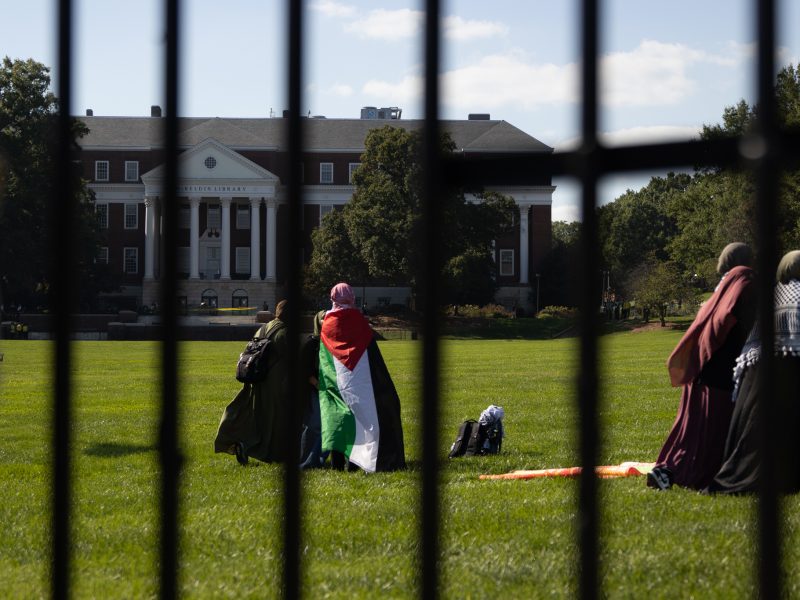
Mosquito shows that Yeah Yeah Yeahs are as relevant as ever.
Yeah Yeah Yeahs seems incapable of making a bad album. After a stunning debut, 2003’s Fever to Tell, the band eluded a sophomore slump with the similarly impressive Show Your Bones and threw fans an enrapturing changeup with 2009’s It’s Blitz! And on Tuesday, the band triumphed once again with the release of its fourth studio album, Mosquito.
I won’t lie: Before listening to the album, I prepared myself for a letdown. After all, the media hype perpetually surrounding the trio had risen to all-new heights after it reportedly slayed when playing four new tracks at March’s SXSW. I hadn’t seen the performance — my budget ruled out the possibility of a trip to Austin, Texas — but I took Mosquito’s buzz with pretty much the whole shaker of salt.
How could Mosquito possibly equal Fever or It’s Blitz!, two of the past decade’s defining alternative records? Nevertheless, I was willing to absolve the band if Mosquito offered just a fraction of the group’s former brilliance.
Ultimately, no forgiveness proved necessary — or maybe I had just pardoned the band from the album’s opening moments. Mosquito lives up to its more-than-considerable hype, delivering the band at its best — eclectic and electrifying.
Originally billed as a lo-fi departure from It’s Blitz!’s ’80s dance floor revivalism, Mosquito largely marks a return to Yeah Yeah Yeahs’ post-punk roots. The New York-based trio’s sound has always had a layer of grime obscuring its art school polish, so listeners won’t necessarily be able to distinguish the album’s atmosphere from Fever. Still, Mosquito is undeniably lo-fi, albeit a different brand than current indie darlings Cloud Nothings’ and Japandroids’ minimalist approaches. Whereas the latter might as well record on a string tied between two cans, Yeah Yeah Yeahs’ recording technology is more the sonic equivalent of the potato clock you made in sixth-grade science class.
Yeah Yeah Yeahs’ critics often deride the band’s persona as mere posturing, calling out the trio as conservatory students playing rock stars. If that’s the truth, it’s an affectation the group would do well to keep up. While its upper-crust roots may sometimes show through, Yeah Yeah Yeahs’ early appeal lies primarily in the scuzzy, sleazy sound of its debut.
While Mosquito isn’t quite the raw, raunchy Fever — the unrelenting, punkish fusillade featured on the debut has been diluted over the past decade — fans of the band’s earlier work will likely prefer it over the glitzier It’s Blitz!
Called a “soul” album by frontwoman Karen O, it seems fitting the record’s opening song and leadoff single lay in its jazziest number, “Sacrilege.” Arguably Mosquito’s most radio-friendly track, “Sacrilege” manages to incorporate funky riffs and a backing gospel choir into the band’s signature danceable sound, though it never feels forced or overwrought.
On track No. 2, the trio switches gears without warning, with a slinky, subdued nod to New York in “Subway.” Karen O’s wraithlike crooning over rumbling train tracks and guitarist Nick Zinner’s haunting, wandering chords prove a brilliant match.
The group’s alleged return to its roots manifests itself fully with the title track. Karen O’s squawks and howls, Zinner’s squealing guitar and Brian Chase’s straightforward drumming — it’s all there, conveniently packaged into a catchy garage-rock zinger.
The rest of the album proves similarly diverse, with the intriguing, reggae-influenced “Under the Earth,” “Area 52” — a bratty, brash ode to extraterrestrials — and “These Paths,” a track that would have sounded equally at home on It’s Blitz! On “Buried Alive,” produced by former LCD Soundsystem member James Murphy, Karen O and Co. toss in a verse from veteran Bronx rapper Kool Keith.
Mosquito’s final quarter is its least abrasive, as the band showcases its softer, fuzzier side. Title notwithstanding, “Despair” is an upbeat call to optimism despite a “wasted life.” On “Always,” the band more or less photocopies a leaf from Best Coast’s book in a beach-ready love song. This love-struck Karen O wasn’t prominently featured on past albums, but perhaps her 2011 marriage has tempered her former raunch into something a bit more domestic. Whatever the reason, somehow, it works.
And then, at last, there’s “Wedding Song.” A gorgeous ballad reminiscent of “Maps,” the Fever-era hit single that largely defines Yeah Yeah Yeahs, “Wedding Song” continues the band’s penchant for including one such staple on each record. Mildly cliched lines (“You’re the breath that I breathe”) manage to sound remarkably inventive coming from experienced lyricist Karen O. “Wedding Song” is both simplistic and wonderfully expressive, a true songwriting triumph for the band.
Overall, fans who go into Mosquito hoping for a rehashed Fever are doomed to mild disappointment. The band has evolved since 2003, and its direction has changed. Mosquito can’t be faulted for not mirroring its predecessors; anyone with marginally receptive ears will agree Yeah Yeah Yeahs has delivered yet another future classic.
diversionsdbk@gmail.com


